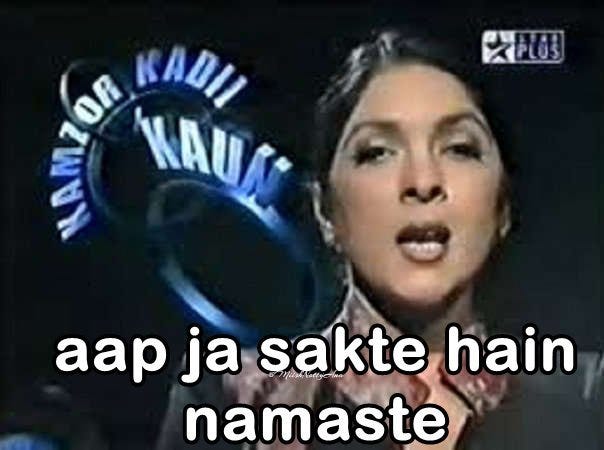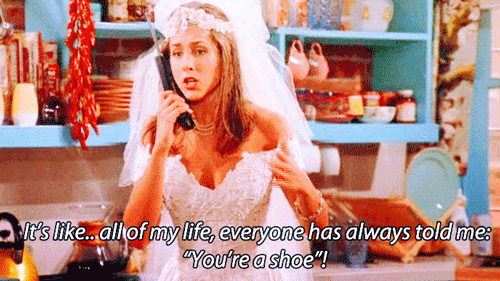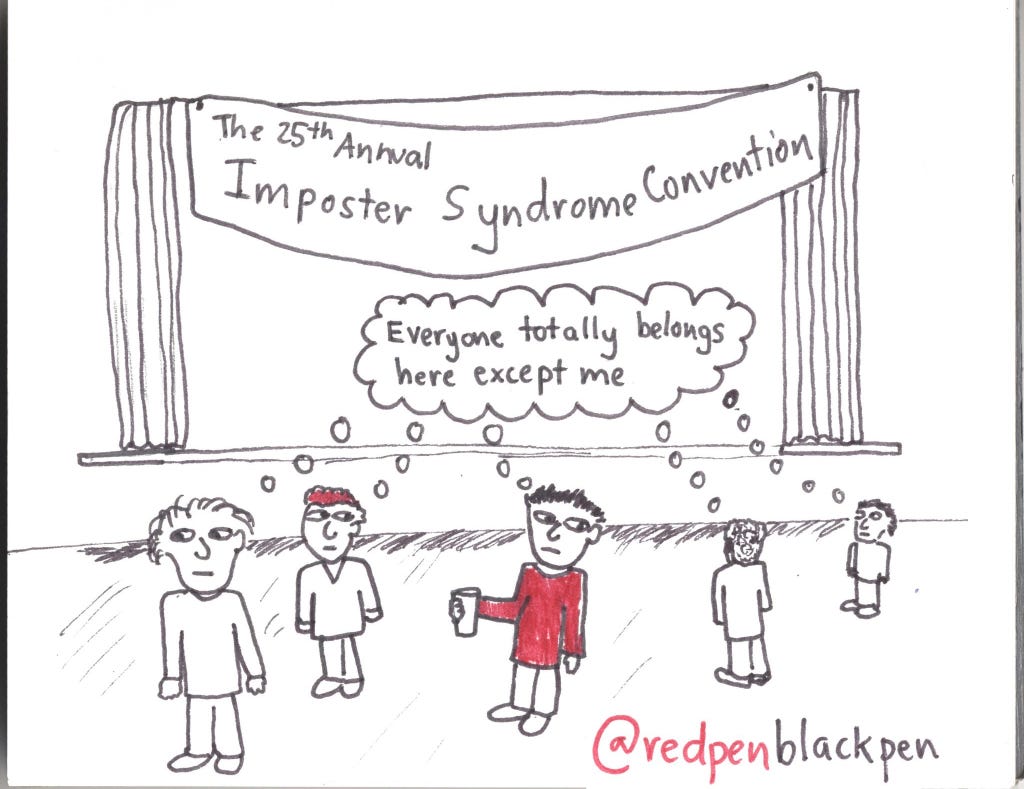Hello ji,
Tell me something - How are you at taking compliments?
Because I have been bad at it for as long as I can recall.
Tell me I am intelligent, I will blame it on good genes.
Tell me I look good in a dress, I will detail how it cleverly hides each one of my flaws.
Tell me you like my last newsletter, I will show you the two typos you missed in it.
Until recently, I used to misdiagnose this as humility. And then I found that this is a far more harmful, and surprisingly common phenomenon. The animal even has a name: Impostor Syndrome.
What is Impostor Syndrome, and do I have it?
Do you, like me, find yourself unable to accept compliments?
Do you think that other people's opinions of your competence are overstated?
Do you find it hard to negotiate a salary, ask for a promotion, or raise your hand for an assignment even when you are sure you deserve it?
Do you sit at work or among peers, secretly thinking that everyone else is better than you, waiting to get caught as the fraud in their midst?
Basically, are you living in dread that someone will realize you are the weakest link and boot your from the reality show of your own career?
Congratulations, you suffer from Impostor Syndrome.
And before you say, "But what if all these doubts are true in just my case?", actual impostors hardly ever feel this kind of self-doubt. So the very fact that you feel you maybe an impostor is proof that you are not one.
Who else feels like this?
Well, you are in stellar company.
Albert Einstein, at the peak of his domination of the world of science, said to a friend, “The exaggerated esteem in which my lifework is held makes me very ill at ease. I feel compelled to think of myself as an involuntary swindler."
Maya Angelou, Pulitzer Prize-nominated poet and author, Grammy winner, Presidential Medal of Freedom awardee and winner of dozens of other international awards, said, "I have written eleven books, but each time I think, 'Uh oh, they're going to find out now. I've run a game on everybody, and they're going to find me out'."
If Einstein and Angelou felt like frauds, you and I are, but, mere mortals.
If Einstein felt like this too, why am I reading about it in Womaning?
Several studies (like this one) have found that women suffer from Impostor Syndrome far more than men. In fact, when it was first discovered, it was assumed to affect only women. Later, men were found to suffer from it too, but the condition still remains much more prevalent among women.
Pallavi Nath, a certified Coach who provides business, executive and personal coaching, spoke to me about the possible reasons for this.
"Right from childhood, girls are brought up to seek permission and aspire for approval. Who we are playing with as kids, what time will we be back from tuition classes, what party are we going to, who else will be there - our every move is tracked and not a toe allowed out of line. We are told we musn’t be too loud, too aggressive, too boisterous. Boys have it easier or don’t have to go through as much. A lot more messaging is also given to us about the roles we have to fit in. What a good wife, a good daughter-in-law, a good mother looks like is a far more restricted stereotype than the corresponding male roles."
These stereotypes follow us to our workplaces where we continue to be so obsessed with our programmed need to camouflage and fit in, we forget that we can also shine and stand out.
Impostor Syndrome can lead women to some seriously self-sabotaging career choices. Like Archana here.
"I don't meet 100% of the requirements"
A global role came up in Archana's firm and every one in the company's leadership told her she would be perfect for it.
"Even though the whole world was telling me to apply for it, I wasn't sure I was ready. It was my classic 'I'm getting it because I'm a woman' logic. I didn't want people to question why was I given this role. So I ended up not applying for it at all. When the position was finally filled, I was shocked to discover that a man who had far less relevant experience than me had been selected for it. The HR leader later told me in confidence that out of the pool of candidates they were considering for the position, I was the only one who everybody unanimously thought could do the job."
Archana regrets passing on a great opportunity because she drowned out the world's appreciation in her own self-criticism.
Years later, as a senior officer in the same firm, she sees the pattern repeating with younger women.
"I see women very often don't apply for internal positions because they feel they meet only 90% of the requirements. Men apply even if they have 10% relevant experience."
No prizes for guessing who walks away with more of the meaty jobs.
“I just got lucky”
Uma Badve is a fitness entrepreneur, turned restaurateur, turned e-commerce professional, turned social worker, turned Chef. Her resume is enough to give the best of us impostor syndromes of our own, but she says that she has genuinely never thought of herself as above average in any way.
It began early. In 10th standard, Uma topped her school. A friend came in second.
"I used to feel like I just got lucky by a few marks. I was sure she put in more effort than I did, and I just got ahead by fluke. I could never enjoy this achievement because I kept feeling guilty."
And it went on even as she founded and grew her own business.
"When my partner and I started our restaurant in Pune, we won the Times Food Award. I used to belittle this achievement every time anyone brought it up. I would say 'Oh there were only three restaurants in our category' or 'It is really not that big a deal'. Now that I think about it, I see that it was a big deal - we were a restaurant owned by two women in the overwhelmingly male-dominated restaurant industry and we won the award just 6 months after opening our first branch!"
After she set up, sold, and successfully exited her restaurant business, Uma became the first woman to be hired as a Business Head and Associate Vice President at one of India's leading home services companies. She would diminish even this achievement by telling herself and others, "I don't know why they hired me. Maybe they wanted some woman representation."
It didn't help that she found herself surrounded by men from IIT, IIM, Stanford, Harvard at this firm.
"I don't have that kind of pedigree, I am a simple engineer from a simple college in Pune. So I used to often feel like I don't belong there. Sometimes, I would even think, 'I am just here as an experiment. They want to see if people like me can also do this job'."
Her peers from the elite institutes would also use a lot of impressive-sounding jargon. To Uma, it was as if they spoke a foreign tongue.
"They would say and write in emails things like 'paradigm shift', 'waterfall effect', 'straight to the bottom line' - it was intimidating because I never learned how to speak like that. My emails, my point of view, my expression is very factual. It accentuated the feeling of not belonging."
Uma's husband would try to give her some much-needed perspective to her situation. He told her that she was the only one at the firm to have successfully set up - not one - but two companies while none of her 'pedigreed' colleagues came with that kind of experience. Even though she didn't know how to use jargon as well as they did, her team was the one growing its business at the highest rate.
"But because of my own lack of conviction in myself, I realize it took both me and the organization that much more time to acknowledge my work.", she says.
“Women do a great disservice to our own careers”
Shreya Prakash is the co-founder of FlexiBees, a company that helps businesses by providing part-time and project-based talent to them, while also providing jobs to qualified women (often new mothers) who are seeking work with flexibility. Recently, she was invited to speak as a panelist at a CEO Conclave. The list of other panelists invited to speak seemed to be the Who's Who of superstar CEOs of India.
"When I received the call from the organising committee, the first thing that came to my mind was 'How can I be on this panel?' It was the first thing I told them too!"
When she went to the event, Shreya found out that all speakers were partnered up into pairs and she was partnered with K Vaitheeswaran. Vaithee is popularly known as the father of e-commerce in India. She was convinced that people would not be interested in her work and her story as much as his.
So she proposed to him that her work could be briefly mentioned during the introductions and the rest of the talk should focus largely on his story.
Vaithee had a different idea.
"I was quite impressed with FlexiBees. I strongly believe that one of the things holding back India's economic growth are the millions of smart, educated and qualified women dropping off from the mainstream workforce for personal reasons (marriage, children, husband's transfer etc.) and any efforts to give them a chance to get back can be a game changer for society. So I was keen that Shreya must also share her story and experiences with the audience", he says.
"I felt some sort of diffidence in her in sharing her story. However, it would have been unfair to the audience if they did not get to know about Shreya's work. I nudged her to talk more about her work. After an initial reluctance, she did open up and as expected, Shreya's experiences went down very well with the audience. As I recall, both of us got a great ovation when the session ended."
In hindsight, Shreya says that she was unconsciously doing a great disservice to herself, her company and her team.
"I am ashamed of myself for what I was going to do that day.", she says, "Here I had a wonderful platform to showcase my company and I was going to squander it away because of my impostor syndrome. It has been a great wake-up call for me and I am going to remember this lesson for a long time."
"'It came to me because I am a woman' is a common excuse we use (and the world uses) to belittle ourselves. But here are the facts - women are fewer in the workplace, in boardrooms, in leadership positions. This is a systemic problem, caused by centuries of inequity - not something we created to benefit from. So yes, maybe some opportunities might come to us as women. But we - as women and as entrepreneurs - are in no position to deny them to ourselves. There are so many systemic disadvantages that we face to this day, that when an opportunity presents itself, it is a disservice to not grab it with both hands."
Okay, so I feel like this too. What can I do about it?
After you are done with this piece, go and Google ‘Impostor Syndrome’. Watch some TED talks about it (this one or this one or this one). Read this wonderful comic about it. Take this test to see how badly you are afflicted.
Most importantly - horror of horrors - talk to friends and colleagues about it. Tell them how you feel. You might be surprised by just how many of them feel the same way!
Impostor Syndrome has power over us largely because we all feel it is our own private, dirty little shame-secret.
It is not.
When we talk to people about it, we realize how insanely common it is. And that begins to disempower the demon already.
“Own your unique abilities” (Yes, you have some)
It is not like the experts are free from the demon either.
Pallavi says that, when she worked in the corporate sector, she used to feel like a child doing an adult's job.
"I would be sitting in board meetings with senior people. There was a reason I was there, of course. But I used to continuously feel like I may say something and everyone would realize that this is a child who is only acting like she belongs among us."
But, she says, however strong these feelings, it is important to know where they are coming from. There are many biases women battle at the workplace. This means that we are asked to prove to the world, again and again, that we can do our jobs.
"In this race to prove our basic worth", Pallavi says, "we tend to ignore the unique skills, talents and abilities we bring to the table. Therefore, we often function from a space where we feel we are faking it. We’re easily frightened into silence, or spoken over, or we let go of our ideas however good they may be. And that is where we are really acting like impostors - not owning our own power and ability."
Only you can figure out what that means for you. I imagine it starts with having the honesty and courage to acknowledge you do have unique powers and abilities.
For me, this begins with a baby step - Next time you send me a compliment, I will consciously turn off my deflection mode and try to just send you this:
“Thank you. 😊
- Mahima”
This newsletter comes to you free of cost. But that does not mean that it costs nothing.
Womaning in India is a physical, mental, and emotional labour of love. If you appreciate the work I am doing with it, you can show me your love by buying me a coffee.










Great Piece! I think the psychological roots go deeper! I think since childhood, men are reinforced for faking it, to display themselves as powerful, brave, aggressive, street smart and hence, faking it till you make it{or not) becomes their default behavior. Also, the entitlement they are given while growing up, that they deserve everything because they are men, so a man who qualifies for a job only 10% gets explained, they have been reinforced to make themselves feel relevant in most irrelevant places.
With women, it's the opposite. They are conditioned to feel irrelevant mostly, to be invisible, and always subjected to criticism under the guise of raising a perfect daughter in law for future. We are bound to feel unanchored in our own selves if all we get are question marks!
You see, families are raising boys and girls in a manner that builds their image, of raising perfect males to dominate and perfect females to surrender, so instilling false pride in men and false shame in women! That's also the perfect recipe for toxic male-female relationships eventually.
Our society basically runs on the polarity of pride and shame. Men get exclamations and women get question marks. So makes sense why both genders are deprived of their authenticity.
Mahima you are a fabulous writer! (I expect you to fully embrace this compliment :) )